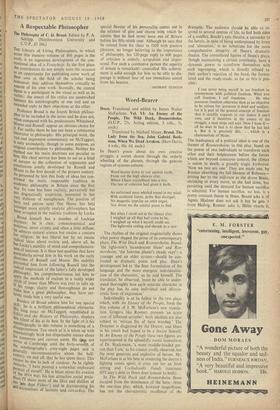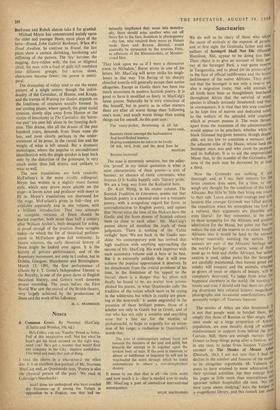Word-Bearer
Ibsen. Translated and edited by James Walter McFarlane. Vol. VI: An Enemy of the People, The Wild Duck, Rosmersholm. (0.U.P., 25s. Acting edition, 3 vols., 5s. each.) Translated by Michael Meyer, Brand, The Lady from the Sea, John Gabriel Bork- man, When We Dead Awaken. (Hart-Davis, 4 vols., 10s. 6d. each.) INI bsen's poem about his own creative struggle, a comet shoots through the orderly wheeling of the planets, through the gaseous regions of systems unborn.
Word-bearer down to our ancient earth, From out the high silences afar, Where Chaos crystallised into a star, The law of cohesion had given it birth.
An unformed mass whirled round in my mind, With scattered forces, paths that diverged, No magnetic impulse an orbit urged, Nor drove me the central peace to find.
But when I stood out.in the silence afar, I weighed up all that had come to be, I weighed up what I myself could see, The light-mist coiling and shrunk to a star.
The rhythm of the original magisterially shows what power shaped the prose of its contemporary plays, The Wild Duck and Rosmersholm. Brand, 'the light-mist's incandescent blaze' and Ros- mersholm, `the lustrous planet's steady rays'—a younger and an older system—should be con- trasted as dramatic poem and play. lbsen's development led to 'the finer formulation of the language and the more energetic individualisa- tion of the characters,' as he said himself. The translator, he observed, 'must be able to under- stand thoroughly how each separate character in the play has its own individual and idiosyn- cratic form of expression.'
Individuality is at its fullest in the two plays which, with An Enemy of the People, form the first volume of J. W. McFarlane's new transla- tion. Gregers, like Rosmer, presents 'an acute case of inflamed scruples'; both idealists are also subject to 'serious fits of hero worship.' The Dreamer is diagnosed by the Doctor, and Ibsen in his youth had hoped to be a doctor himself. In An Enemy of the People these two figures are superimposed in the splendidly manic iconoclasm of Dr. Stockmann, 'a more muddle-headed per- son than I am,' as his creator coolly observed, but the most generous and explosive of heroes. Mr. McFarlane is at his best in rendering the doctor's fighting comic spirit; it cries out for an Irish setting and Cockadoodle Dandy treatment (O'Casey's debt to Ibsen does honour to both).
In The Wild Duck and Rosynersholm Ibsen escaped from the dominance of the hero--from the one-man play, which, however magnificent, has not the characteristic excellence of the dramatic. The audience should be able to re- spond to several centres of life, to feel both sides of a conflict. Brecht's epic theatre, a surrender to the heroic, in spite of being underpinned by irony and 'alienation,' is no substitute for the more comprehensive integrity of lbsen's dramatic theatre. The constellated figures of lbsen's plays, though maintaining a certain continuity, have a dynamic power to transform themselves with each regrouping, which is directly related to their author's rejection of the fixed, the formu- lated and the ready-made, as far as this is pos- sible: I can never bring myself to see freedom as synonymous with political freedom. What you call freedom, I call freedoms. . . He who possesses freedom otherwise than as an objective to be striven for, possesses it dead and soulless; for it is part of the general concept of freedom that it steadily expands as one makes it one's own, and if therefore in the course of the struggle, a man stops and says `Now 1 have it'— all he does in fact is to show that he has lost it. But it is precisely this,. . . which is a characteristic of States.
The inadequacy of a political ideal is one of the themes of Rosmersholm; in this play, based on the power of two individuals to transform each other and their helplessness before the forces which are beyond conscious control, the climax is union in death, a grandly tragic Liebestod. 'Now we two are one.' They are made one, by Rosmer absorbing the full likeness of Rebecca— driving her to the mill-race as she drove Beata, shrinking at every move, as she had done, but persisting until the demand for human sacrifice is admitted. For human sacrifice, no less, is a pretty constant theme in Ibsen. Brand asks it of Agnes, Hjalmer does not ask it but he gets 't from Hedvig, Rosmer asks it, Hilda exacts it,
Borkman and Rubek almost take it for granted.
Michael Meyer has concentrated mainly upon the older and younger Ibsen, upon plays of the hero—Brand, John Gabriel Borkinan, When We Dead Awaken. In contrast to Brand, the last plays show a certain shrinking, hardening and stiffening of the pattern. The 'fey' heroine, the nagging, duty-ridden wife, the lost or blighted child, the man with a load of guilt still modulate into different groups; but action slows, characters become fewer; the power is centri- petal.
The dramatists of today tend to use the easier pattern of a single centre; though the indivi- duality of the Caretaker, of Hamm, and Krapp, and the tramps of Waiting for Godot. depends on the loneliness of creatures socially formed. In our cooling planet, where speech, the great social creation, slowly slips away from Hamm or the victim of leucotomy in The Caretaker, the 'burnt- out pair' are seen left alone in the freezing.dark- ness. This drama, like all the drama of the past hundred years, descends from Ibsen none the less, and most clearly perhaps in the under- statement of its prose, in the casual line and the weight of what is left unsaid. But a dramatic monologue, where the impulse to unconditional identification with the single speaker is kept back only by the distortion of the grotesque, is very much easier than full drama, and unlikely to wear so well.
The new translations are both readable; McFarlane's is the more vividly colloquial; Meyer has written in a slightly more formal style, which may prove more pliable on the stage—it leaves actor and producer with more to fill in. Meyer's translations are shortened for the stage, McFarlane's given in full—they are available separately and in one volume, with a brilliant introduction. That two attempts at complete versions of Ibsen should be started together, both more than half a century after William Archer's, both designed for acting, is proof enough of the position Ibsen occupies today—to which the list of theatrical perform- ances in McFarlane gives full testimony. In future volumes, the early theatrical history of Ibsen might be looked over again. It is the history of private performances, and of the Repertory movement, not only in London, but in Dublin, Glasgow, Manchester and Birmingham. March 13, 1891, the first performance Ghosts by J. T. Grein's Independent Theatre at the Royalty, is one of the great dates in English theatrical history, and Grein's work deserves proper recording. The years before the First World War saw the revival of the British theatre, very largely achieved by the productions of Ibsen and the work of his followers.
M. C. DRADBROOK



































 Previous page
Previous page